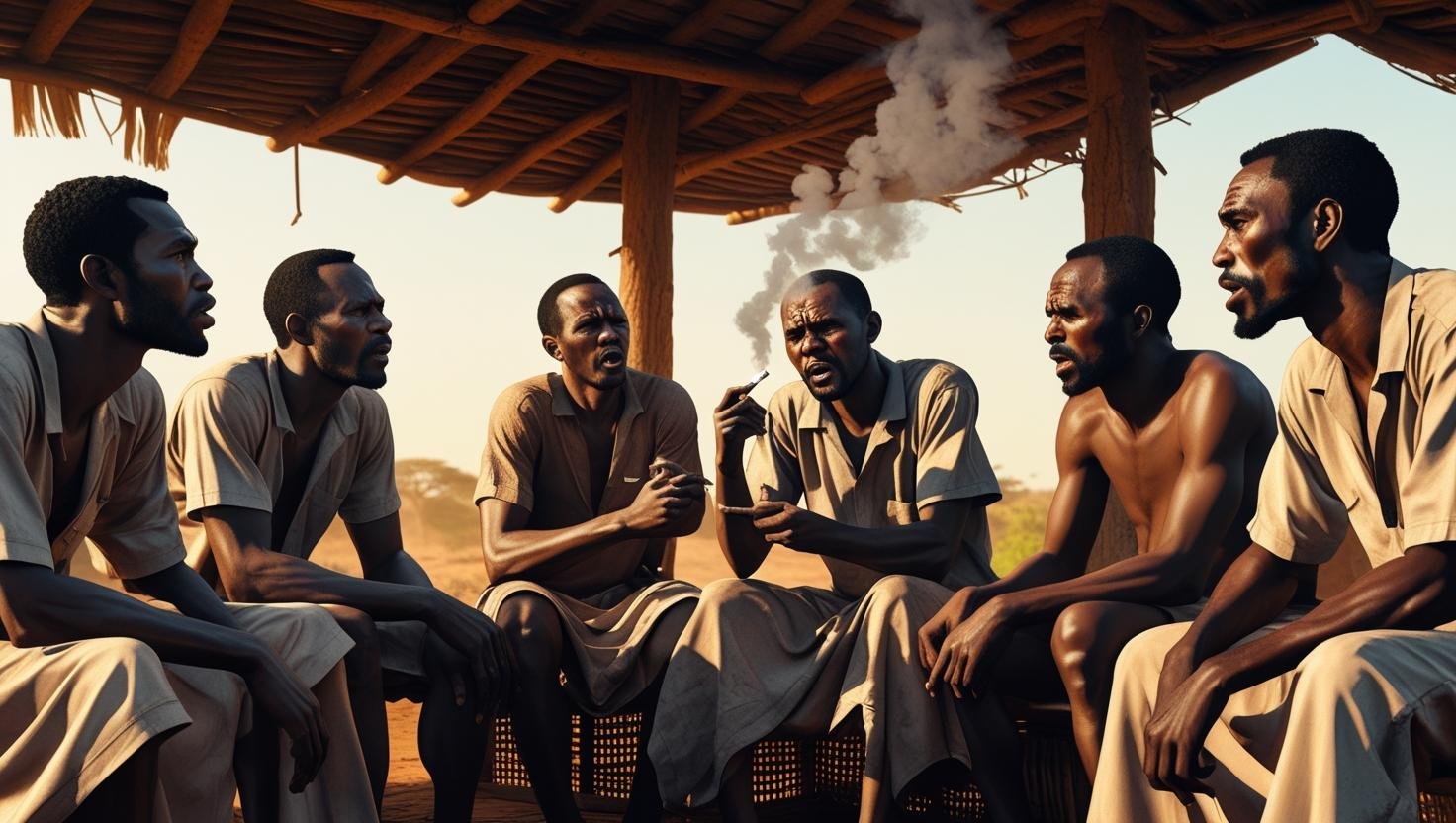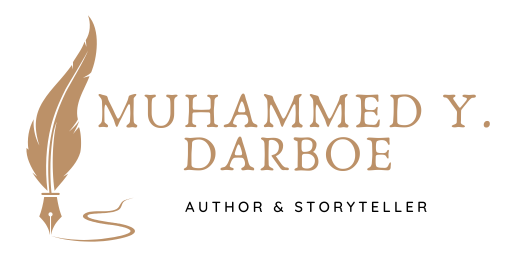Blog
When You Have Just One Chance To Vent Your Rage.

. . . Pa Touray shifted on his stool, adjusting the folds of his wrapper. Silence no longer served his chest.
“What kind of sense is it—when people, full-grown, keep running from politics? And yet, they talk. About rice. About rent. About roads. Who make these decisions if not the same people they refuse to question?”
He leaned forward, locking eyes with no one in particular.
“We speak of healthcare as though it’s a miracle. Education, like it’s charity. Every breath we take is politicized—and still, we act like it’s none of our business.”
His voice cracked slightly as his finger tapped the table.
“It must be everybody’s business. Or it will consume us all.”
Across the group, Pateh exhaled slowly.
“Maybe we’ve already been consumed, Pa. Perhaps we’re just roaming with full bellies and empty vision.”
He shifted his gaze to the ground, his voice thoughtful but weighed down.
“We’re tired. We’ve become a people who wake angry, sleep angrier. Every street corner carries rage. Every conversation looks for a target.”
He paused.
“And the ones who once had real ideas? They’ve gone quiet. Or they’ve disappeared.”
His fingers drummed on the bench.
“No one listens. Not really. That’s why the sensible ones had to retreat. What good is a voice in a market where everyone’s shouting?”
Malang snorted, halfway through lighting a stick of tobacco.
“That’s your weakness, Pateh. Always trying to explain away the obvious.”
He puffed once.
“We are angry because we are poor.”
Another puff.
“And poor people don’t argue—they survive. Fifty-two years in this broken system. What has politics brought?”
He didn’t wait for a response.
“You’re still begging. Still hustling. Still patching shoes for lunch money.”
He pointed at Pateh; eyes narrowed.
“You vote like a loyal dog every five years, and your roof still leaks like a broken promise. So please—keep your sweet theories to yourself.”
Sulayman cleared his throat gently.
“Malang, you speak with pain. I feel it. But pain should push us to fix things, not to run.”
He let the words settle before continuing.
“If we abandon this space, what’s left? More men who speak for us without us?”
He looked around.
“You think your silence protects you? It cages you. Political apathy is not an escape—it’s surrender.”
He pointed at the ground beneath their feet.
“This country… this tiny piece of land we all call home—it cannot afford passengers. Everyone must drive or be dragged.”
Pa Touray nodded, tightening his grip on the tea kettle.
“Exactly. Every vote counts. Every voice. If we want change, we must be the ones to demand it.”
He poured a round of tea and handed Sulayman a cup.
“This is not the time to quit.”
Sulayman took the cup, his tone calm but assertive.
“There’s hope, even in division. We’re a small country. Families overlap. Villages interconnect. If we lean into that unity, there’s a path forward.”
Malang shook his head slowly.
“That path you speak of is blocked, Sulayman. Not by people—but by poison.”
He lifted his hand and pointed at the horizon.
“Poisoned minds. Tribal loyalties. Ethnic propaganda.”
Another drags of smoke.
“Those who promised unity are now the architects of division.”
He turned away from the group.
“We’ve been splintered beyond repair.”
A rustle behind the group. The latecomer, Burama, stepped into the light with a folded newspaper under his arm. His reputation preceded him.
He raised his hand.
“I wasn’t going to speak.”
He paused.
“But this has gone too far.”
The others sat up straighter, unsure what angle he’d take.
“Say what you want, but things have changed. Roads are being built. Courts are open. Ministers are held to account.”
He turned to Malang.
“You call it poison—I call it progress.”
Burama raised the paper.
“According to a global index, we’re among the top ten fastest recovering democracies in the region.”
He let the words hang, then added, with a smirk,
“And I’ve traveled. I’ve seen worse.”
Pa Touray leaned back; voice dry.
“Bravo, Burama. You’ve mastered the textbook response. Gold stars and standing ovations.”
He raised his tea in mock salute.
“We’re grateful for your enlightenment.”
Laughter rippled, but Bakary remained still. Then he spoke.
“Don’t clap for nonsense, Pa.”
He rose slightly in his seat.
“Politics is not about roads or reports—it’s about truth. We removed a tyrant, yes… but not tyranny.”
He gestured toward Burama.
“Those who once drank from the dictator’s cup are now preaching democracy like they invented it.”
Bakary’s eyes flashed.
“It’s the same kitchen. They just changed chefs.”
Malang chuckled.
“That’s why I trust this man. Bakary doesn’t wear perfume over garbage.”
He jabbed his finger at Burama.
“You sang for the old regime until the last breath. You told us there would be no transition—swore it on the radio. We remember.”
His voice deepened.
“And now you talk to us about ratings and reforms?”
He spat on the floor beside his sandal.
“Our people ran across borders like hunted deer. Some stocked food like war was tomorrow. Gari disappeared from shelves.”
The silence that followed weighed more than his words.
Burama clenched the paper in his fist.
“I came to greet a friend, not to be chewed by bitterness.”
He turned.
“Opposition is your right. Insults are not.”
Bakary stood fully now, arms crossed.
“Then walk away, Burama. But carry this truth with you—no matter where you go.”
He began to leave.
“I refuse to dignify thieves with the title of leaders. They’re misleaders.”
Pa Touray reached out.
“Bakary, let’s not end it this way—”
But Malang interrupted.
“No, Pa. Let it end this way.”
He stood beside Bakary.
“The same architects of our suffering now dine on our taxes. The killers of our cousins walk free.”
His voice cracked.
“And justice sleeps while the rest of us dream with our eyes open.”
Sulayman looked into the firelight.
“Maybe… maybe that’s the real cost of freedom. We argue not because we hate each other, but because we cannot agree on what pain should feel like.”
He stood and joined them in silence.
The tea had gone cold. The mango leaves whispered overhead.
***
You can buy the book from here: https://mydarboe.com/
Jaali Demba sat nearby, never spoke. He scribbled into his book.
“Even the loudest frogs do not know when the water has dried.”
